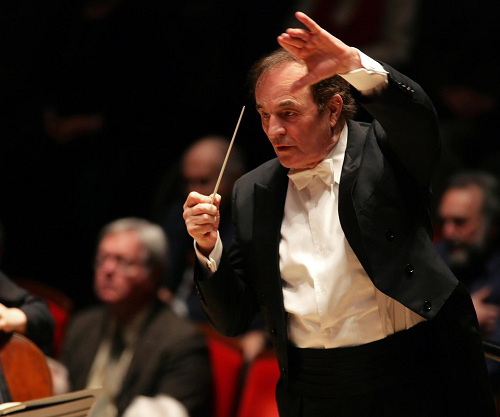Dutoit leads CSO in vibrant Spanish program

France and Spain may not appear to be as culturally connected as one might expect given their shared border. But in the arts the mutual influences are clear, if sometimes flowing more freely in one direction than another.
Thursday in Orchestra Hall, Swiss-born conductor Charles Dutoit and Spanish pianist Javier Perianes partnered with the Chicago Symphony Orchestra in vibrant, strongly idiomatic accounts of two of Manuel de Falla’s best known works.
It justifiably irks Spaniards when critics suggest that the best Spanish music is written by French composers, but first-rate Iberian-tinged works by Ravel and Debussy make the observation plausible. Yet Falla’s best music makes a strong argument for the homegrown product, and Dutoit presented that case with just enough swagger to counterbalance his trademark zeal for inner detail.
In his nearly five decades leading both the Montreal Symphony and Philadelphia Orchestra, Dutoit built a reputation for exacting standards, most notably with respect to precisely gauged balances and transparent textures. The conductor has made a specialty of French and Russian music, a point that will be made next week when he leads the CSO in an all-Stravinsky program. These preferences served him well in this colorful program, though one wished for at least a brief respite from music familiar from countless pops concerts.
Falla’s Nights in the Gardens of Spain occupies a middle terrain between piano concerto and tone poem. The work reflects its original lineage as a set of piano nocturnes, as well as the composer’s desire to evoke scenes in Granada with a specificity beyond the capabilities of a solo concert grand. It’s not surprising that Dutoit has a particular affinity for the work, given his past marriage to Martha Argerich, the Argentine pianist who made this music one of her trademarks.
Perianes was clearly in his comfort zone, each gesture imbued with just the right color and nuance to evoke the perfumed nocturnal setting of Falla’s beloved Granada. At times his left hand underplayed important filigree in the middle and lower registers, but his well-honed digital prowess and emphasis on the work’s mild dissonances made for a compelling reading. Among many standouts in the wind sections, English horn player Scott Hostetler’s soulful lyricism was a particular pleasure.
In pops concerts, Falla’s The Three Cornered Hat usually appears in the form of one of the two extracted suites, but these excerpts exclude some exquisite music. The complete ballet, as presented Thursday, includes an introduction with pounding percussion, shouts and hand-claps from the orchestra (always an amusing pleasure coming from tuxedo-clad instrumentalists), as well as its familiar vocal incantation. Mezzo-soprano Daniela Mack delivered a solid performance, but it’s a pity that CSO management didn’t seek out a vocalist with experience in the flamenco tradition, as the best realizations of the ballet usually do.
Dutoit’s take on Ravel’s Alborada del Gracioso was spirited and fleet, primary voices underlined but never at the expense of the broader palette.
The one non-Spanish outlier in the program was Paul Dukas’ The Sorcerer’s Apprentice, an uber-popular warhorse that received its American premiere in 1899 by the Chicago Symphony under Theodore Thomas, and was performed nearly every season thereafter for a decade. The work carries heavy baggage from its appropriation in Disney”s Fantasia, but Dutoit managed to bring freshness to the experience, due in large part to exceptional solo and section work from top to bottom.
Guest principals Demarre McGill (flute) and Mary Lynch (oboe) were capable, if a bit underpowered, and the the soon-to-depart Christopher Martin was his usual strong presence leading the trumpet section.
With all of the consternation over defections among the principals, the CSO can at least take pride in the acquisition of bassoonist Keith Buncke, who delivered solo passages with an ease and musicality not often heard on the famously cantankerous instrument. Contrabassoonist Miles Maner was a delightfully grumpy counterweight to Buncke’s agility.
The program will be repeated 8 p.m. Saturday and 3 p.m. Sunday. An all de Falla, “Beyond the Score” program will be presented 7:30 Friday. CSO.org; 312-294-3000.
Posted in Uncategorized

